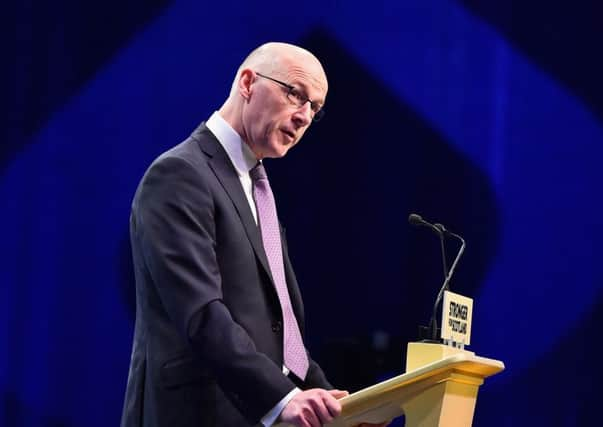Swinney faces rebellion over flagship school reforms


In the same week that exam results are announced, an “extraordinary” meeting is to be held by the Convention of Scottish Local Authorities (Cosla) at which leading figures in the education system will voice their concerns.
Teaching unions, councillors and education officials will attend Thursday’s meeting to air their fears that Swinney’s proposals will increase red tape and distract from efforts to close the attainment gap that sees pupils from wealthier backgrounds outperform their poorer counterparts.
Advertisement
Hide AdAdvertisement
Hide AdNicola Sturgeon has said improving education is her top priority in government and has staked her personal reputation on closing the schooling gap between the rich and poor.
The appointment of Swinney, her most trusted and capable minister, as education secretary was seen as a strong sign of her determination to turn round the Scottish education system.
But this week the Deputy First Minister will receive a major setback when the Cosla meeting hears complaints of poor teacher recruitment, heavy teacher workloads, budget cuts and unhappiness across the political divide at the direction his key education strategies are taking.
A rift between the Scottish Government and local government will open up when members of Cosla’s Education Executive Group, which is made up of local authority education conveners, raises fundamental objections to key parts of Swinney’s plan.
At the heart of the dispute are councils’ objections to Scottish Government plans to hand millions of pounds of funding directly to head teachers as well as the establishment of new education regions.
The move to give legal responsibility for raising standards to schools is supposed to encourage decision-making by those who are best placed to know what their catchment areas require and is broadly supported by the Conservatives.
However, local authorities are concerned that their role as education providers will be bypassed, removing a crucial layer of accountability from the system. They also fear it is part of a centralising agenda that will see the government wrest control of education from councils.
In addition, councillors and unions fear the change will saddle head teachers with unnecessary bureaucracy.
Advertisement
Hide AdAdvertisement
Hide AdYesterday Frank McNally, Labour councillor and North Lanarkshire education convener, said: “There is a concern, which has been expressed across the political divide, about the course the Scottish Government is planning to take. There is concern there could be a loss in local accountability.
“The last thing we need is for the Scottish Government to set up a regional education quango that takes away that sort of link with local authorities.”
On plans to give head teachers control over budgets, McNally said: “Head teachers want to get on with teaching our children. The head teachers I have spoken to do not want to get bogged down with being procurement managers and accountants. Really the red tape should be taken away from them and dealt with by our education team within the council.
“I think if head teachers are focused on things that are frankly disassociated with education in areas of procurement, specialist HR matters or effectively being accountants – really increased red tape – that will have an impact on their leadership when it comes to the attainment challenge.”
His concerns were shared by Stephanie Primrose, an SNP councillor who is Cosla’s children spokeswoman. Primrose said: “We need to look at how we close this gap, but chucking random money at it is not going to help. If you are giving head teachers money in one hand, you are giving them increased bureaucracy and increased administration. That’s not what head teachers want.”
She added: “I think the Scottish Government have made a decision whereby they are going to throw the baby out with the bathwater. Local authorities are in the right position to do these tasks.”
The prospect of Swinney’s reforms removing local accountability worries Frank McAveety, the leader of Scotland’s largest local authority, Glasgow City Council. McAveety believes councils have a crucial role to play if a school is underperforming.
“If a head teacher is not delivering for their school, who is going to hold that head teacher to account if local authorities are not empowered to do so?” McAveety asked.
Advertisement
Hide AdAdvertisement
Hide AdAlthough Glasgow is no longer a member of Cosla, the local authority’s executive director for education, Maureen McKenna, will be attending Thursday’s meeting in her role as president of the Association of Directors of Education in Scotland.
She said: “Believing that giving money directly to heads is the answer is overly simplistic. It will take all of us working together in a strong climate of professional trust and confidence to reduce the impact that the growing spectre of poverty has on our children.”
Long-standing concerns about teacher shortages will also be raised. Many councils have complained about the lack of people in the profession, with Aberdeen City Council claiming the situation is so dire that schools may have to close.
Labour also claims it is wrong that the schools’ attainment fund is to be financed by councils putting up council tax for high-band houses and not by increasing income tax. Such a move would see the Scottish Government shift the blame for tax hikes on to local authorities, it argues.
Last night a Scottish Government spokeswoman said: “It’s important that more decisions about the life of schools are driven by the schools themselves, which is why we are launching a governance review in September which will devolve decision-making and funding. We hope Cosla will play a constructive role in this review process.
“Our reforms to council tax will raise an additional £100 million to close the attainment gap, protect household incomes and make local taxation fairer.”